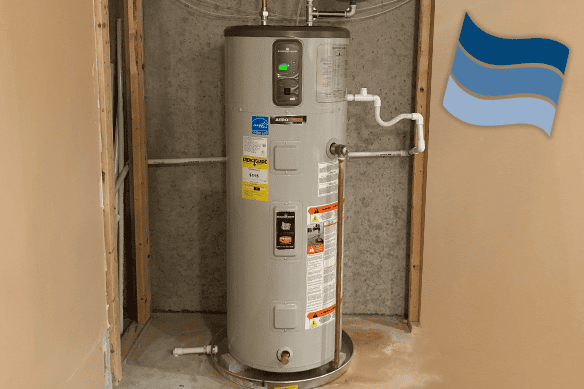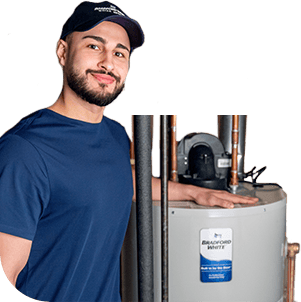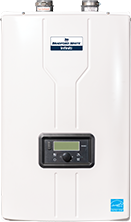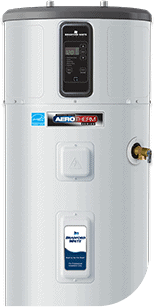Demystifying the Heat Pump Water Heater: Powering Up Your Home with Efficiency

As homes adopt more efficient technologies, the heat pump water heater emerges as a true standout for its ability to blend utility and usefulness with efficiency and eco-friendliness. But what exactly is a heat pump water heater, and why should it be on every homeowner’s radar? As efficiency becomes more important and sustainability more urgent, understanding this game-changing appliance is more critical than ever.
Rethinking Our Hot Water Habits
The traditional water heater has long been the unsung workhorse of the home, quietly working to provide the hot water your family needs. But that work requires energy. Water heating is the second largest user of energy in a home, often accounting for about 18% of a household’s utility bill. As we challenge ourselves to be more energy-conscious (and lower our utility bills), we look for alternatives that can deliver the same level of performance (or better), but with greater efficiency and a smaller carbon footprint.
The heat pump water heater is a great example of efficiency and sustainability. Unlike conventional units that generate heat directly using electricity or gas, a heat pump water heater moves heat from one place to another using a compressor and a refrigerant. It uses the existing heat in the air around the water heater to help heat the water.
Heat pump water heaters are two- to three-times more efficient than traditional electric water heaters and can save you hundreds of dollars a year on your electric bill. They are frequently ENERGY STAR® certified for their outstanding efficiency. Products with the ENERGY STAR® label meet strict efficiency criteria established by the U.S. Environmental Protection Agency (EPA).
Bradford White’s dedication to energy efficiency innovation, education, and promotion has made the company a five-time ENERGY STAR® Partner of the Year (2020, 2021, 2022, 2023 & 2024). Learn more about Bradford White’s ENERGY STAR® certified water heaters here.
On the Brink of a Heat Pump Revolution
The U.S. Department of Energy (DOE) suggests that the heat pump water heater can reduce water heating energy costs by as much as 50%, making it one of the most energy-efficient options currently on the market. This is a significant saving for any household, but the environmental impact goes far beyond the monthly utility bill. The heat pump water heater has no greenhouse gas emissions. Plus, by requiring less electricity to heat water, a heat pump unit can significantly reduce your carbon footprint.
And the good news doesn’t stop there. As a byproduct of its operation, the heat pump water heater also extracts humidity from the air to provide drier indoor conditions. The moderated dehumidification offers an extra layer of comfort, especially in hot and muggy climates, without the energy-hungry demands of a traditional dehumidifier.
Understanding the Inner Workings
A heat pump water heater’s operation may seem mysterious, but it’s actually pretty easy to understand. It heats water the same way a refrigerator cools food, just in reverse. It’s a clever application of a simple principle – the conservation of energy. The heat pump relocates heat rather than creating it, making it much more efficient. Here’s a brief breakdown of how it works:
The Water Circuit
Water enters the heater where it’s initially preheated by ambient air drawn into the system. This warm air then circulates through the refrigerant, which increases its temperature. The now-heated refrigerant is compressed, producing even higher temperatures, which are passed through the water tank’s heat exchanger which transfers the heat to the water.
The Electrical Element Safety Net
In instances where the ambient air temperature can’t provide enough heat (such as in cold environments or during high-demand periods), a backup electric element kicks in to ensure you always have enough hot water. But unlike an electric water heater that runs whenever water is heated, the electric backup on a heat pump water heater is only used when absolutely needed, maximizing the overall efficiency of the system.
Assessing the Suitability for Your Home Setup
While the benefits of a heat pump water heater are clear, it’s important to consider if this system is the right fit for your home by weighing factors such as climate, the location of your water heater, and available space.
Climate Considerations
Heat pump water heaters work most efficiently in warmer climates, as they rely on extracting heat from the air. That’s why they’re particularly popular in places with mild winters and longer cooling seasons. However, recent advancements in technology have expanded the operational range of these systems, making them more viable in colder climates.
Space and Location
The unit’s location within your home is crucial. Heat pump water heaters need a bit more space than traditional tank models because they draw heat from the air around them. They perform best in a well-ventilated space with enough cubic feet of air space— typically about 1,000 cubic feet of air surrounding the water heater.
Your plumbing professional can help you determine whether a heat pump water heater is right for you. Need to find a plumbing professional near you? Search here to find a Bradford White contractor in your area.
The Economics of Change
The initial cost of a heat pump water heater can be higher than a traditional electric water heater, but over time the heat pump water heater can lower your electric bill which could save up to hundreds of dollars a year. In this way, the heat pump water heater can effectively pay for itself over time.
ENERGY STAR®-certified heat pump water heaters may be eligible for rebates and tax incentives which can help lower your up-front cost. Look for local utility rebates or federal tax credits in your area that you can use now to save money on your heat pump water heater purchase.
Furthermore, the ecological benefits, particularly in terms of overall emissions reduction, can be part of a larger strategy to help protect our environment.
The Verdict: The Future Is Warm and Green
The heat pump water heater exemplifies the kind of innovations that are redefining our homes, leading us to lower energy bills and more sustainable lifestyles. Its efficiency, comfort-enhancing properties, and potential for long-term savings make it an appealing option for homeowners looking to make a positive impact on their energy usage and the environment.
Choosing a heat pump water heater is not just a financially-savvy choice for your home-it’s a step towards a brighter, more sustainable future. Ready to learn more? Check out Bradford White’s AeroTherm® Series heat pump water heaters which feature advanced technology and exclusive Microban antimicrobial protection. They offer five different operational modes so you can get the right combination of performance and efficiency for your needs, and Bradford White Connect™, which turns your heat pump water heater into a smart, connected appliance that can be easily controlled via a smartphone app.



